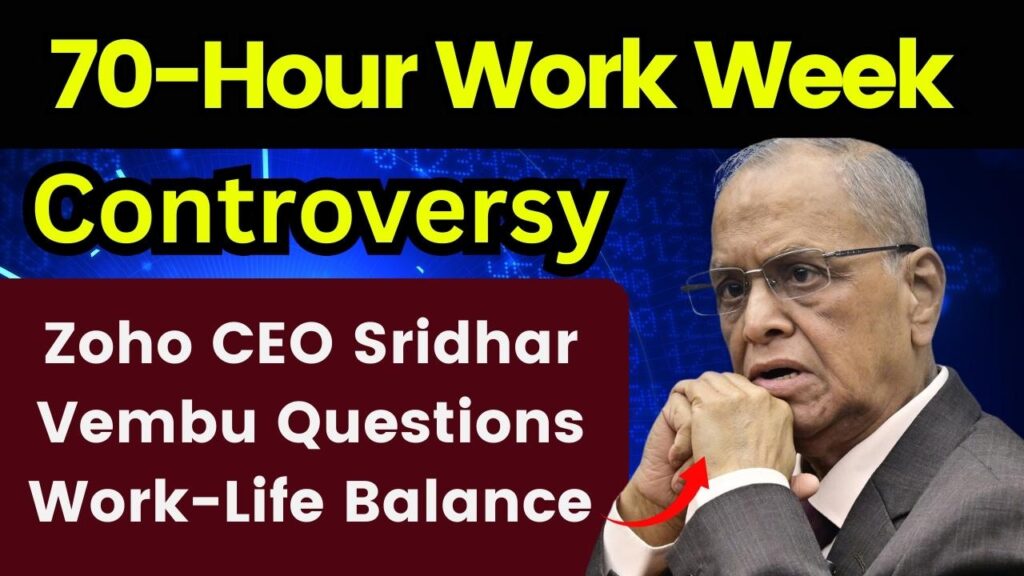
70-Hour Work Week Controversy: The idea of a 70-hour workweek has recently sparked widespread debate, with prominent voices like Infosys co-founder Narayana Murthy advocating for it to enhance India’s productivity. However, Zoho CEO Sridhar Vembu questions whether such a work culture is sustainable, warning of its impact on health, demographics, and overall happiness. Let’s delve into this topic to understand its nuances, its implications, and practical advice for finding the right balance between work and life.
70-Hour Work Week Controversy
| Key Data/Insights | Summary |
|---|---|
| What is the 70-hour workweek? | A proposed work schedule where employees work around 10 hours daily, 7 days a week, to boost productivity. |
| Proponents | Narayana Murthy believes it is necessary for economic growth in India. |
| Opponents | Sridhar Vembu warns about societal and demographic consequences. |
| Impact Examples | East Asian countries have experienced reduced birth rates and social stress due to such work cultures. |
The debate over the 70-hour workweek raises critical questions about the balance between economic growth and personal well-being. While ambitious work schedules may drive short-term productivity, their long-term impacts on health, relationships, and societal stability cannot be overlooked. Striking a balance between work and life is not just a personal choice but a strategic imperative for sustainable growth.
By learning from global examples and embracing balanced models, individuals and organizations can achieve productivity without sacrificing well-being. Whether you’re an employee or a policymaker, the goal should always be to foster an environment that nurtures innovation, health, and happiness.
Understanding the 70-Hour Workweek Proposal
The concept of a 70-hour workweek isn’t new; it’s modeled after productivity-driven economies such as Japan and South Korea. Narayana Murthy suggests this could help India compete on a global scale, emphasizing: “India’s work productivity is one of the lowest in the world… my request is that our youngsters must say, ‘This is my country. I’d like to work 70 hours a week.’”
Murthy’s perspective reflects the drive for rapid economic growth and global competitiveness, particularly for developing economies like India. By encouraging such a work ethic, he believes the country can unlock its untapped potential and catch up with more developed nations. This approach also aligns with historical shifts seen during industrial and technological booms in other countries.
While the suggestion comes from a place of ambition, critics argue that this approach could harm individual well-being and national demographics. Vembu highlights the demographic challenges in East Asia, where extreme work cultures have led to population declines and increased stress levels. Additionally, concerns about equity arise, as not all individuals may have the resources or health to sustain such intense work schedules.
Global Examples of Extended Work Hours
- Japan: Notorious for “karoshi” (death by overwork), Japan has faced severe repercussions from its work culture. Despite economic gains, the country’s workforce has struggled with physical and mental health challenges.
- South Korea: Efforts are underway to reduce work hours after years of an overworked population experiencing declining birth rates and low happiness indices. The government has even capped weekly work hours to address these concerns.
- United States: Certain industries, like tech, operate with flexible hours but can still demand long workweeks during critical project phases. While this culture has driven innovation, it has also highlighted the need for effective work-life integration policies.
The Arguments Against a 70-Hour Workweek
1. Health and Well-being
Prolonged work hours can lead to:
- Chronic stress
- Increased risk of cardiovascular diseases
- Sleep deprivation and burnout
For instance, a 2021 study by the World Health Organization revealed that working 55+ hours per week increases the risk of stroke by 35% and heart disease by 17%. These findings underline the importance of moderation in work schedules, even in high-performance industries.
Extended work hours also significantly affect mental health. Employees may experience anxiety, depression, and a sense of disconnection from their families and communities. Long-term, this can result in reduced overall productivity and higher healthcare costs for employers and governments.
2. Demographic Challenges
Countries with high-pressure work environments, like China, are witnessing steep population declines due to:
- Couples delaying or avoiding childbirth
- Reduced family time impacting quality of relationships
In South Korea, for example, the fertility rate has dropped to one of the lowest in the world, partly attributed to the demanding work culture. Such demographic trends can result in labor shortages and economic stagnation over time. India, with its young population, must carefully navigate these risks to maintain its demographic advantage.
3. Economic Productivity vs. Sustainability
While extended hours may boost short-term output, diminishing returns often set in. Productivity isn’t about the number of hours worked but the efficiency of those hours. Research from Harvard Business Review suggests that overworked employees often produce lower-quality results compared to those who maintain balanced schedules. A well-rested workforce tends to innovate better and sustain higher energy levels.
The Case for Balance: Sridhar Vembu’s Perspective
Vembu proposes an alternative model. He emphasizes:
- Selective Intensity: Only 2-5% of the population should engage in extreme work schedules. These roles should focus on critical leadership or innovation positions.
- Work-Life Integration: Encouraging flexible hours and remote work can lead to sustainable productivity. This approach has gained traction during the COVID-19 pandemic, showcasing its effectiveness in maintaining business continuity while improving employee satisfaction.
- Demographic Sustainability: Ensuring that economic ambitions align with societal well-being. For instance, policies that promote family-friendly workplaces, such as on-site childcare and parental leave, can help mitigate demographic risks.
Vembu’s insights reflect a broader vision of economic development, prioritizing the long-term welfare of the population over short-term gains. This perspective advocates for creating an environment where employees can thrive both professionally and personally.
Practical Advice for Professionals
1. Set Clear Boundaries
Define work hours and stick to them. Use tools like calendars and reminders to manage time effectively. For example, scheduling “no-meeting” blocks can help employees focus on deep work without interruptions.
2. Prioritize Health
- Schedule regular breaks to recharge your mind and body.
- Include physical activity in your routine, such as walking meetings or fitness classes.
- Practice mindfulness to manage stress. Apps like Headspace and Calm can provide guided meditations.
3. Evaluate Productivity
Focus on results rather than time spent. Use productivity frameworks like the Eisenhower Matrix to prioritize tasks. This approach helps in distinguishing between urgent and important tasks, enabling better decision-making.
4. Encourage Open Communication
If workloads are overwhelming, discuss adjustments with managers. Organizations thrive when employees are heard. Regular check-ins and feedback sessions can foster a supportive work culture.
5. Explore Flexible Options
Leverage technology for remote work opportunities, which can reduce commute times and offer better work-life integration. Hybrid work models, where employees alternate between office and home, have shown promising results in enhancing productivity and morale.
FAQs About 70-Hour Work Week Controversy
Q1: What is a 70-hour workweek?
A 70-hour workweek typically involves working 10 hours a day for 7 days, aimed at increasing productivity. It is often proposed for industries requiring high output but raises concerns about sustainability.
Q2: Is it healthy to work 70 hours a week?
Long hours can negatively impact health, increasing risks of burnout, heart disease, and mental stress. Moderation and adequate rest are key to maintaining well-being.
Q3: Why is Narayana Murthy advocating for this model?
Murthy believes India’s economic growth and global competitiveness require enhanced productivity. His proposal aims to inspire a stronger work ethic among the younger generation.
Q4: What does Sridhar Vembu recommend instead?
Vembu suggests sustainable productivity models focusing on work-life balance, flexible schedules, and policies supporting demographic health.
Q5: How can professionals manage work-life balance effectively?
Setting clear boundaries, prioritizing health, focusing on results, and leveraging flexible work options are practical strategies to maintain balance.








